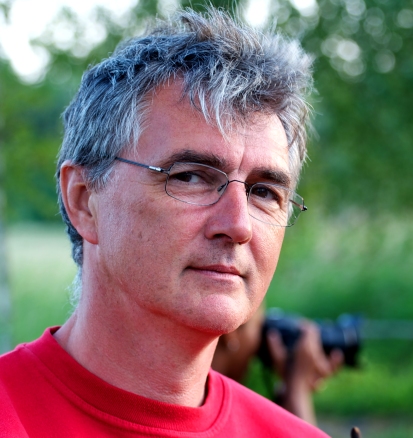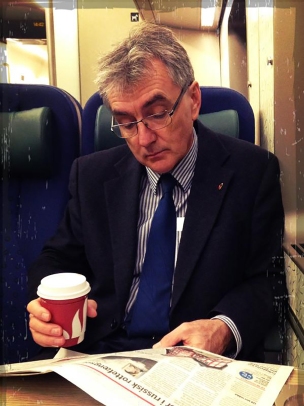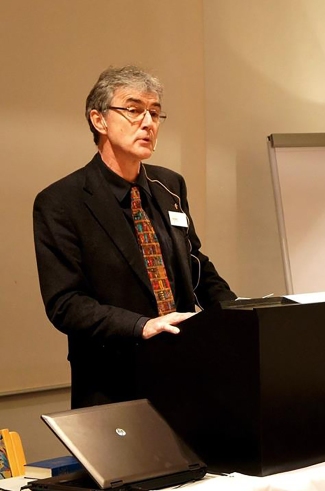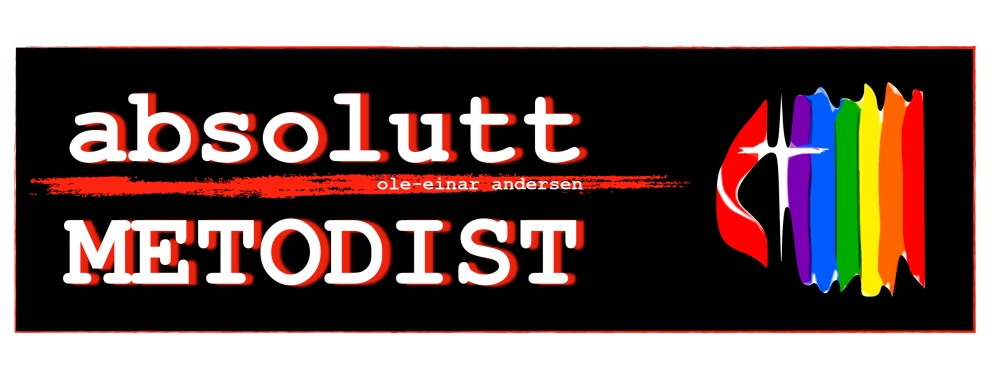Metodistkirken i Danmark vedtok på sin årskonferanse i mai en henvendelse til Judicial Council (Juridisk Råd) hvor konferansen ber om en ”Declatory Decision” på spørsmålet om lovligheten i setningen som ( etter benkeforslag ) i 1972 ble tilføyd Disiplinens (BoD) paragraf 161.7: ” … at homoseksuell praksis er uforenlig med kristen lære”!
 Pastor, tilsynsmann (og fremragende teolog) Jørgen Thaarup (bildet over), fremmet forslaget som den danske årskonferansen vedtok med soleklart flertall; én stemte i mot og én blankt. Henvendelsens endelige ordlyd og utforming finpusses i disse dager, og henvendelsen blir i løpet av kort tid oversendt Juridisk Råd. (Thaarup hadde for øvrig fremmet samme forslag til «Sentralkonferansens Råd», ( Central Conference Council), men rådet ville ikke støtte den…)
Pastor, tilsynsmann (og fremragende teolog) Jørgen Thaarup (bildet over), fremmet forslaget som den danske årskonferansen vedtok med soleklart flertall; én stemte i mot og én blankt. Henvendelsens endelige ordlyd og utforming finpusses i disse dager, og henvendelsen blir i løpet av kort tid oversendt Juridisk Råd. (Thaarup hadde for øvrig fremmet samme forslag til «Sentralkonferansens Råd», ( Central Conference Council), men rådet ville ikke støtte den…)
I ask the Denmark Annual Conference to make a formal petition to the Judicial Council for a Declaratory Decision on the legality of the sentence added to the BoD § 161. 7) “… and considers this practice incompatible with Christian teaching.”
Absolutt Metodist skulle inderlig ønske at noen, dersom det er praktisk og kirkejuridisk mulig, foreslår og sørger for at Metodistkirkens Årskonferanse i Bergen i juni vedtar en støtteerklæring til våre danske venners formelle henvendelse til Juridisk Råd!
Ikke kirkelov
”Jeg hevder at denne setningen er ukonstitusjonell. Det er meget viktig for diskusjonen om menneskelig seksualitet innen United Methodist Church at vi får en ”declatory decision” fra Juridisk Råd som klargjør legaliteten til teksten som står i Sosiale Prinsipper i dag”, sier Jørgen Thaarup i sin begrunnelse. Han påpeker at spørsmålet om homoseksualitet ikke omtales i United Methodists Church’s grunnleggende læredokumenter.
 Homoseksualitet omtales i de Sosiale Prinsipper, og i forordet til prinsippene fastslås det at de ”ikke skal anses som kirkelov”. De sosiale prinsippene har karakter av inspirasjon og retningslinjer for hvordan vi praktiserer vår tro, men er ikke en lovtekst og angir heller ingen ny standard for tolkning av lovtekster i Book og Dicipline, sier Thaarup.
Homoseksualitet omtales i de Sosiale Prinsipper, og i forordet til prinsippene fastslås det at de ”ikke skal anses som kirkelov”. De sosiale prinsippene har karakter av inspirasjon og retningslinjer for hvordan vi praktiserer vår tro, men er ikke en lovtekst og angir heller ingen ny standard for tolkning av lovtekster i Book og Dicipline, sier Thaarup.
”Det er min oppfatning at den tilføyede setningen er meget uheldig. Dels kobler den spørsmålet om homoseksualitet sammen med kristen lære og gjør holdningen til homoseksualitet til et lærespørsmål, noe som setter hele kirkens enhet og grunnlag på spill», sier Jørgen Thaarup – ”og dels finner vi ikke i noen av våre standardskrifter om kirkens struktur noen tekst som handler om seksualitet, familiestruktur og samlivsformer”, påpeker han.
”Hensikten med forslaget er først og fremst å frigjøre holdningen til homoseksualitet fra spørsmålet om kirkens enhet og sammenhold, noe jeg synes er av stor betydning”, sier Thaarup. I en tid, hvor homoseksualitet er på dagsordenen i alle deler av kirken, synes han det er viktig at diskusjonen holdes på det nivå der spørsmålet hører hjemme, og at det ikke løftes til et nivå, hvor verken vi selv, som metodister, eller andre kirkesamfunn, har ført diskusjonen og tatt beslutninger.
Henvendelsen til Juridisk Råd er på en måte kvintessensen av en artikkel som Thaarup i mars i år la fram på en stor (metodist)teologisk konferanse i USA i regi av General Board of Higher Education and Ministery (GBHEM) og de 13 UMC teologiske seminar i USA, samt Reutlingens Seminarium og Africa University. Dessuten var omkring 1/3 av biskopsrådets kommisjon ”A Way Forward” med som observatører. Konferansen som hadde tittelen: ”The Unity of the Church and Human Sexuality: Toward a Faithful United Methodist Witness” ble ble arrangert på Candler School of Theology ved Emory University i Atlanta, Georgia. ( se www.gbhem.org/colloquy)
 Thaarup opplyser til Absolutt metodist at han opplevde meget positiv respons på framleggelsen av artikkelen. Hans bidrag var også et av få som kommisjonen ”A Way Forward” valgte å ta inn i sitt videre arbeid! Samtlige omkring 30 artikler som ble presentert på Emory vil bli publisert av GBHEM. Straks det har skjedd, vil Thaarups artikkel bli gjengitt av Absolutt Metodist. Det skjer trolig i løpet av sensommeren/høsten.
Thaarup opplyser til Absolutt metodist at han opplevde meget positiv respons på framleggelsen av artikkelen. Hans bidrag var også et av få som kommisjonen ”A Way Forward” valgte å ta inn i sitt videre arbeid! Samtlige omkring 30 artikler som ble presentert på Emory vil bli publisert av GBHEM. Straks det har skjedd, vil Thaarups artikkel bli gjengitt av Absolutt Metodist. Det skjer trolig i løpet av sensommeren/høsten.
Anbefalt bibelstudium!
Jørgen Thaarup skrev for en del år siden et bibelstudium som har vært tilgjengelig på den danske metodistkirkens hjemmeside. Bibelstudiet er blitt kopiert og brukt i en del andre kirker og organisasjoner, men innen Metodistkirken er det merkelig nok trolig kun den danske pastorale sesjon som har jobbet med Thaarups grundige studiemateriale. Men det finnes altså tilgjengelig for alle og enhver – og bør tas i bruk av menigheter og bibelgrupper innen Metodistkirken i Norge. Du finner det her: her: www.metodistkirken.dk/fileadmin/Upload/Kirken_og_Homofili/Studokkirken.pdf.
Thaarup vurderer for øvrig å forfatte en engelsk og oppdatert versjon av bibelstudiet i løpet av året.
ØNSKE OM DECLATORY RULING
Under kan du lese Jørgen Thaarups forslag til henvendelse til Juriudisk Råd. Den endelige utformingen pågår som nevnt i disse dager, men henvendelsen vil i innhold ikke avvike mye fra følgende:
The Denmark Annual Conference of the United Methodist Church appeals to the Judicial Council to make a declaratory ruling on the legality of the sentence added to the BoD § 161. 7) “… and considers this practice incompatible with Christian teaching.”
The rational for the appeal is the following:
“Christian teaching” we understand as a synonymous wording for Christian Doctrine, our theological position according to our standards of confession. The Constitution § 3 defines the doctrinal standards for the United Methodist Church, naming both the Articles of Religion and the Confession of Faith. The Constitution § 17 and § 18 states the restrictive rules that the General Conference shall not change our doctrinal standards of the Articles of Religion and the Confession of Faith, neither shall the General Conference add any new standards or rules of doctrine.
In the Bod § 102 we find our history of doctrinal standards, and we find our understanding of our theological task. “Doctrinal statements in form of creeds, confessions of belief, and articles of faith were officially adopted by churches as standards of Christian teaching.” Our distinctive heritage as the United Methodist church is inspired by the Christian teaching contained in the Standard Sermons of John Wesley and the liturgical formative texts, the Hymnals and Sunday Service, which are also resources in doctrinal positions of the United Methodist Church. The Bod § 102 is the place in the Bod where the wording “Christian teaching” is most used and defined. The Bod § 103 ends with a clarification of the “standards or rules of doctrine” thus continues to be restricted before the presentation of the Articles of Religion in Bod § 104.
For the still ongoing interpretation of our theological position in any new time the BoD § 105 present the so called Quadrilateral as a Methodist Theological method. This method of using the Scripture, the Tradition, the Experiences and the Reason as instruments and sources for new theology is never in the BoD understood as to be in contrast to the Articles of Religion or the Confession of Faith or to add any new position. The description of the Theological Task in the future is not in conflict with the restrictive rules of the Constitution defining and upholding our doctrinal standards, our standards of Christian teaching.
The question of homosexuality is not addressed in the doctrinal standards of the United Methodist Church. The question of homosexuality is not a question of doctrinal standards or standards of faith. The homosexuality is addressed in the Social Principles, and the preface to the Social Principles states that “the Social Principles are not to be considered church law.” While stated that the Social Principles are not to be considered church law, this statement gives the Social Principles a character of inspiration and guidelines for faith praxis, but not a law text or a new standard for interpretation of the law texts of the BoD.
The question of homosexuality is not addressed in our standards of Christian Teaching, defined and restricted in the Constitution, it is not a question of Standards of Faith, and it is not in conflict with the standard of confession we have in the Constitution and in the text of theological heritage and future.
The sentence added to the BoD § 161. 7) “… and considers this practice incompatible with Christian teaching” is unconstitutional.
All other places in the BoD where the wording is added “… practice incompatible with Christian teaching» are unconstitutional.
—
Dette blir kjempespennende å følge med på! Og Metodistkirken i Norge bør altså sørge for å informere Juridisk Råd om at vi stiller oss bak den danske henvendelsen!

